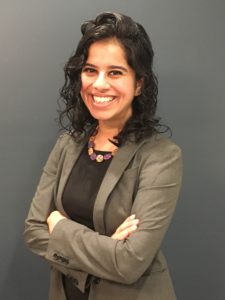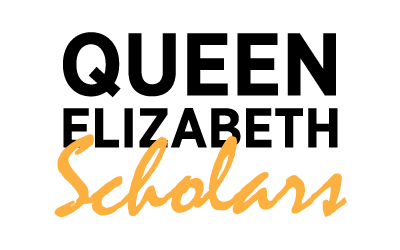Zohra Lakhani had nearly finished the first year of her Master of Education program at the Ontario Institute for Studies in Education (OISE) at the University of Toronto when she first heard about the Queen Elizabeth Scholars (QES) program through a student listserv.
“It was exactly what I was looking for,” she said.
 Lakhani had deliberately taken a heavy course load in her first year of the two-year program to ensure she had a lighter load in her second year to allow her to do a placement abroad. Though she was not sure how she would manage it. She wanted to travel as part of her studies, but did not have the resources to finance the trip herself. For Lakhani, the QES program was the perfect fit.
Lakhani had deliberately taken a heavy course load in her first year of the two-year program to ensure she had a lighter load in her second year to allow her to do a placement abroad. Though she was not sure how she would manage it. She wanted to travel as part of her studies, but did not have the resources to finance the trip herself. For Lakhani, the QES program was the perfect fit.
The vision for QES -the Canadian Queen Elizabeth II Diamond Jubilee Scholarship – is to mobilize a dynamic community of young global leaders to create lasting impacts both at home and abroad through inter-cultural exchanges encompassing international education, discovery and inquiry, and professional experiences.
Scholars are selected by their home universities to contribute to existing projects with partner universities abroad to address important local, national, and global issues.
Lakhani had worked in Kenya before, and was hoping to do a placement there to further her research into Kenya’s recent curriculum reforms. And while QES allowed her to do that, her placement working with a professor at the University of Nairobi unexpectedly changed the course of her research, and her career goals.
Kenya has two of the largest refugee camps in the world: the Dadaab Refugee Complex in the east, and Kakuma in the northwest. Both camps have been in existence for more than 20 years, and some refugee families who first settled there in the 1990s are now raising children and grandchildren there. Providing adequate education is a constant challenge.
“There needs to be more investment in education [for refugees,]” Lakhani explained. “These are not temporary situations. We can’t leave people behind.”
Lakhani’s placement gave her the opportunity to do research in the area of refugee education, and gave her a first-hand perspective of how these challenges can impact a country that hosts hundreds of thousands of refugees.
“I now want to pursue my career in education in emergencies and refugee education,” she said.
Refugee crises often begin with political and economic turmoil. When citizens of those countries have to flee for their own safety, their opportunities for education are all but eliminated.
“How are you going to rebuild a country and develop leaders if only one per cent of global refugees have access to post-secondary education?” Lakhani asked. “Education provides the capacity to return home and rebuild your country.”
In addition to doing research, Lakhani had the opportunity to present her earlier research into Kenya’s curriculum reforms at two academic conferences, one in Embu, a more rural area. It was her first time presenting her research.
“The QE scholarship gave me the open door to be there at the right time to present my work to the people who were most interested in it.”
“This is the experience people need to have, to understand, to learn, to contribute,” she said of her QES placement. Experiences like this are “the most memorable and the most beneficial, especially for young Canadians.”
Since returning home from her three-month placement in July, Lakhani is keen to ensure her colleagues at OISE seek out similar opportunities.
“My goal is to talk about the [QES] program and tell colleagues to explore opportunities for internships or research opportunities abroad,” she said. “It’s an invaluable opportunity for Canadians to go abroad.”
When asked about her future plans, Lakhani says she will complete her MEd, then seek out career opportunities in her field.
“I don’t think I have one single, narrow path,” Lakhani said. “My path is growing wider.”
As a result of her research, she aspires to engage with organizations working in education in emergencies. But mostly, she hopes to deepen her knowledge of refugee education, and make a positive impact in the world.
“I’m still digging. I’m still learning,” she said.
* * * * * * *
The world is changing, and Canada needs its youth and future leaders to be equipped with global fluency to prosper. However, only 3.1 per cent of Canadian students per year go abroad on international study programs or exchanges, one of the lowest numbers among Organization for Economic Co-operation and Development (OECD) countries.
The Rideau Hall Foundation is proud to collaborate with Universities Canada and Community Foundations of Canada on the Queen Elizabeth Scholars program. Together we are helping to nurture young Canadians into global citizens while promoting Canada as a destination for the world’s top talent and attracting top talent and international research leaders to Canada.


